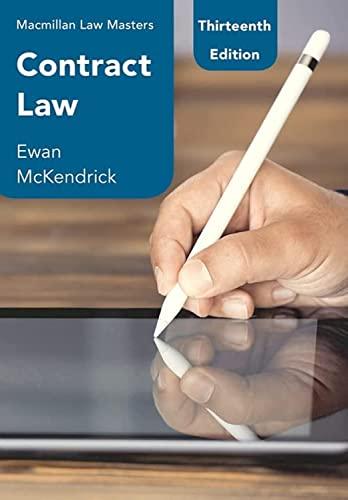Question
Facts: David Chase was a television writer-producer with many credits, including a detective series called The Rockford Files . He became interested in a new
Facts:David Chase was a television writer-producer with many credits, including a detective series calledThe Rockford Files. He became interested in a new program, set in New Jersey, about a "mob boss in therapy," a concept he eventually developed intoThe Sopranos. Robert Baer, a prosecutor in New Jersey interested in writing for television, met Chase and pitched his own idea for a television series about the New Jersey mafia. Baer didn't know that Chase was pursuing a similar idea. Baer arranged meetings for Chase with local detectives and prosecutors, who provided Chase with information about their experiences with organized crime and showed him various New Jersey locations. Baer also met with Tony Spirito, who gave Chase colorful background information about the local mafia. After returning to Los Angeles Chase wrote and sent Baer a draft forThe Sopranos'pilot, which Baer commented on. AfterThe Sopranosbecame a hit show Baer sued Chase, alleging that on three separate occasions Chase had agreed that if the program succeeded, Chase would "take care of" Baer, and would "remunerate Baer in a manner commensurate to the true value of his services." The District Court dismissed the case, holding that the alleged promises were too vague to be enforced. Baer appealed.
Issue:Was Chase's promise definite enough to be enforced?
Holding:Judgment for Chase affirmed. New Jersey law deems the amount of compensation an essential term of any contract. A contract lacking a definite price may still be enforceable if the parties specify a practicable method by which they can determine the amount. In the absence of an agreement as to the manner or method of determining compensation the purported agreement is invalid. A definite duration for the contract is also essential under New Jersey law. New Jersey law does not support Baer's argument that "submission-of-idea" cases create an exception to these rules. There is no proof the parties agreed on how, how much, where, or for what period Chase would compensate Baer, the value of Baer's services, how the "success" ofThe Sopranoswould be measured, how profits were defined, or the duration of the contract.
- Chase said he would "take care of" Baer and pay him "in a manner commensurate with the true value of his services." Don't those statements show Chase's intent to compensate Baer?
- Then why does the court rule in favor of Chase and let him avoid payment?
- There are methods to determine what fair compensation would be. The trial court could hear evidence about what others who've made similar creative contributions to television shows are paid, or hear expert testimony from people in the business about the customary payment for services similar to Baer's. Why doesn't the court try to arrive at a method of fair compensation?
- How does the court arrive at its decision?
- Does that mean the parties must specify a dollar amount in the contract for its terms to be definite?
- So Chase and Baer could have agreed, say, that Baer would be compensated in an amount equal to the average paid for screenwriting services for the pilots of the three most popular HBO television serials within the previous two years?
Step by Step Solution
There are 3 Steps involved in it
Step: 1

Get Instant Access to Expert-Tailored Solutions
See step-by-step solutions with expert insights and AI powered tools for academic success
Step: 2

Step: 3

Ace Your Homework with AI
Get the answers you need in no time with our AI-driven, step-by-step assistance
Get Started


